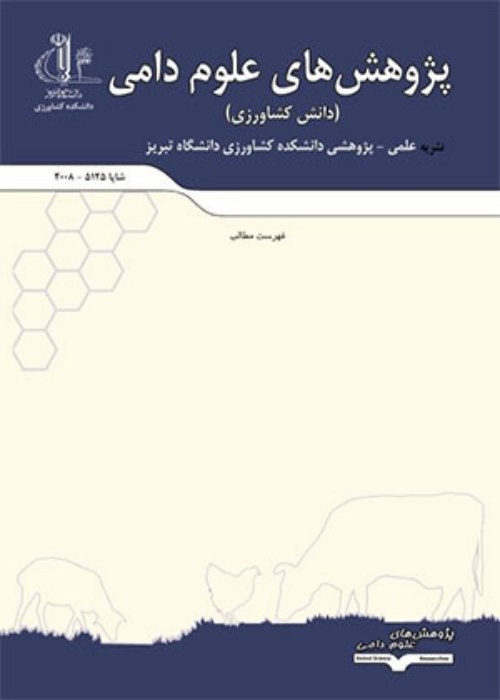Effect of Miswak (Salvadora persica L.) stem and leaf and Myrtle (Myrtus communis) leaf on performance and cecal bacteria of broiler chicken
Author(s):
Article Type:
Research/Original Article (دارای رتبه معتبر)
Abstract:
Introduction
Because of beneficial consequences of herbal plants on the performance and intestinal microlflora of broilers (Windisch et al. 2008), they have been proposed as an organic alternative to antibiotic growth promoters. Miswak (Salvadora persica) is a plant that grows around Mecca and in the Middle East area in general. High levels of active compounds such as flavonoids, eugenol, sodium chloride, potassium chloride, salvadourea, alkaloids and oleic and linoleic acids are present in Miswak. It has antibacterial, antioxidant and antifungal properties (Battaa et al. 2013). There is no report on the influences of dietary supplementation of Miswak in broiler chickens. However, in a previous study dietary supplementation with different levels of Miswak (0.50, 0.75 and 1.0% diet) improved performance as well as reproductive performance of Dokki4 laying hens (Battaa et al. 2013). Common Myrtle (Myrtus communis) belongs to the Myrtaceae family. The genus Myrtus includes flowering plant with approximately sixteen species reported in areas of the Middle East and Asia. Myrtle is one of the important aromatic and medicinal species from this family. It is a native plant to southern Europe, North Africa and west Asia (Nadkarni, 1989). Different compounds such as 1,8-cineole, linalool, linalyl acetate, terpineole, terpinolene, tannins and flavonoid are found in dried leaves of Myrtle. However, antibacterial, antifungal and antioxidant properties of this herb have been reported (Garg and Denger, 1988). Mahmoudi Bardzardi et al. (2012) indicated that dietary supplementation with 100, 200 and 300 mg/kg diet of Myrtle extract improved body weight gain and also feed conversion ratio of broilers. In another study, it was shown that addition of Myrtle extract reduced the adverse effects of aflatoxin-contaminated diets on broilers (Sadeghi et al. 2013). On the other hand, Myrtle extract can reduce the count of E. coli and increase the number of Lactobacillus in gut system of broilers (Ghazanfari et al. 2014). The aim of the current study was to investigate the effects of Miswak stem and leaf powder and Myrtle leaf powder on the performance and cecal bacteria of broilers.Material and
Methods
A total number of 408 one-day-old Cobb -500 chicks (male and female) were obtained from local hatchery and transferred to the rearing place. In a completely randomized design, birds were allocated to 6 experimental treatments with 4 replicate pens of 17 chicks each. The control group was provided a basal diet without any feed additive, while supplemented groups were received same basal diet which supplemented with one of the following feed additives: antibiotic (1g Neomycin/Kg diet), 0.5% stem and leaf powder of Miswak, 1% stem and leaf powder of Miswak, 0.5% Myrtle leaf powder and mix of 0.5% stem and leaf powder of Miswak 0.5% Myrtle leaf powder. All groups had free access to starter (d 1-21) and finisher (d 22-42) diets, throughout the rearing period. Fresh steam and leaf of Miswak and leaf of Myrtle were collected from the range of Larestan, Fars Province, Iran. They were dried in shadow, finely ground and added to the experimental diets based on their dosage. Body weight and feed intake were measured on 21 and 42 days of age. Moreover, at 21 and 42 days of age, one bird from each replicate pen (4/treatment) was slaughtered and samples of cecal content were collected to determine the population of E coli and Lactoacillus bacteria.Results And Discussion
The current findings indicated that feed intake was not significantly influenced by dietary treatments (P> 0.05) throughout the study. Dietary addition of 0.5% Myrtle had deleterious effects on body weight gain and feed conversion ratio during starter phase of the study. Thus, birds fed diet containing 0.5% Myrtle gained less body weight and worse feed conversion ratio than those feed the control diet (P0.05). In line with these results, Al-Fadil et al. (2013) did not find positive effect of Neomycin on broiler body weight. Bulbul et al. (2014) reported that supplementation with 500, 1000 and 2000 mg/kg Myrtle oil did not influence broiler body weight gain while, 5000 mg/kg of this additive decreased body weight gain. Inconsistency in their results and others was attributed to the source and levels of Myrtle oil. In contrast to our results, in a previous study (Battaa et al. 2013) dietary supplementation with Miswak resulted in significant improvements in performance and reproductive traits of Dokki4 laying hens. On day 21, significant differences were observed in count of E.coli and Lactobacillus bacteria among experimental treatments (PConclusion
Under condition of the current study, dietary addition of different feed additives (antibiotic, Miswak and Myrtle) had no significant effect on broiler body weight gain, feed intake and feed conversion ratio. Population of cecal Lactobacillus and E coli were significantly influenced by the feed additives which used in the current study. Keywords:
Language:
Persian
Published:
Journal of Animal Science Research, Volume:27 Issue: 3, 2018
Pages:
61 to 72
magiran.com/p1784623
دانلود و مطالعه متن این مقاله با یکی از روشهای زیر امکان پذیر است:
اشتراک شخصی
با عضویت و پرداخت آنلاین حق اشتراک یکساله به مبلغ 1,390,000ريال میتوانید 70 عنوان مطلب دانلود کنید!
اشتراک سازمانی
به کتابخانه دانشگاه یا محل کار خود پیشنهاد کنید تا اشتراک سازمانی این پایگاه را برای دسترسی نامحدود همه کاربران به متن مطالب تهیه نمایند!
توجه!
- حق عضویت دریافتی صرف حمایت از نشریات عضو و نگهداری، تکمیل و توسعه مگیران میشود.
- پرداخت حق اشتراک و دانلود مقالات اجازه بازنشر آن در سایر رسانههای چاپی و دیجیتال را به کاربر نمیدهد.
In order to view content subscription is required
Personal subscription
Subscribe magiran.com for 70 € euros via PayPal and download 70 articles during a year.
Organization subscription
Please contact us to subscribe your university or library for unlimited access!



